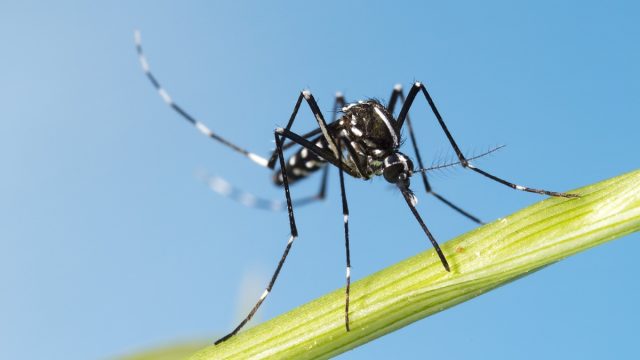If You Live in These States, Watch Out for This Potentially Disabling Mosquito

No one likes mosquitos, and certainly no one looks forward to getting bitten by one. But those itchy red bumps we’re used to dealing with as the result of the average mosquito bite may be the least of our worries, considering some mosquitos can transmit serious illnesses to humans. Lately, experts have been warning inhabitants of certain states—more than half, in fact—to watch out for one type of dangerous mosquito: the Asian tiger mosquito. It has the ability to infect you with multiple harmful diseases, including one virus with “disabling” symptoms that has no available treatment or vaccine, according to the Centers for Disease Control and Prevention (CDC).
RELATED: For more up-to-date information, sign up for our daily newsletter.
Asian tiger mosquitoes are an invasive species that came to the U.S. from northern Asia in the mid ’80s, according to the Center for Invasive Species Research (CISR) at the University of California, Riverside. This mosquito typically feeds on humans during the day and is a “very efficient” spreader of a wide range of pathogens, the CISR says. Asian tiger mosquitoes are can carry Eastern Equine Encephalitis (EEE), Zika virus, West Nile virus, and dengue fever, and it’s also one of the only—and primary—spreaders of the disabling chikungunya virus.
The CDC says the most common symptoms of a chikungunya infection are fever, joint pain, and swelling, but those infected may also experience a headache, muscle pain, or rash. The agency says that most people infected with chikunguyna will develop some type of symptoms, which are often “severe and disabling.”
“There is no vaccine to prevent [chikungunya] infection and no treatment for an infection,” the CDC warns. “The best way to prevent getting infected is to protect yourself and your family from mosquito bites.”
If you’re wondering how to spot an Asian tiger mosquito, know that the name comes from the insect’s distinctive white and black color pattern, per the Illinois Department of Public Health (IDPH). They are black with white stripes and silver-white bands.
Unfortunately, this mosquito breeds in “nearly any sort of water-filled container,” so the IDPH says that they can become very common and bothersome, even in areas where mosquitos are normally not prevalent.
“Anytime you’ve got standing water around, you do have a good breeding environment for mosquitoes,” Lynn Sutfin, a public information officer with the Michigan Department of Health and Human Services, told Michigan Radio on July 22. “So in cases where you have something that could be dumped out—such as a bucket, a planter that’s not being used, or a kiddie pool—we definitely encourage folks to do that.”
While the rate of Asian tiger mosquitos has risen dramatically in some midwestern states, these are hardly the only areas you’ll see this dangerous insect. Over the course of the past four decades, the Asian tiger mosquito has spread to nearly 30 states, according to the CDC’s latest estimate of the insect’s range in 2017. Read on to find out if these mosquitos are spreading in your state.
RELATED: If You Live Here, Prepare for a Mosquito Invasion Like You’ve Never Seen.
1
Alabama

2
Arkansas

3
Connecticut

4
Delaware

5
Florida

RELATED: If You Live in These States, Prepare to See More Tarantulas.
6
Georgia

7
Illinois

8
Indiana

9
Kansas

10
Kentucky

RELATED: This Is the Most Hated Insect in the U.S., New Survey Shows.
11
Louisiana

12
Maryland

13
Massachusetts

14
Michigan

15
Mississippi

16
Missouri

17
New Jersey

18
New York

RELATED: If You Live Here, Prepare to See More Scorpions, Experts Say.
19
North Carolina

20
Ohio

RELATED: If You See This Bug, Call Local Officials Immediately, Experts Warn.
21
Oklahoma

22
Oregon

23
Pennsylvania

24
Rhode Island

25
South Carolina

26
Tennessee

27
Texas

RELATED: This Is How Many Types of Venomous Snakes Are in Your State.
28
Virginia

29
West Virginia

RELATED: This State Is Under Quarantine Due to Fire Ants—11 Others Could Be Next.